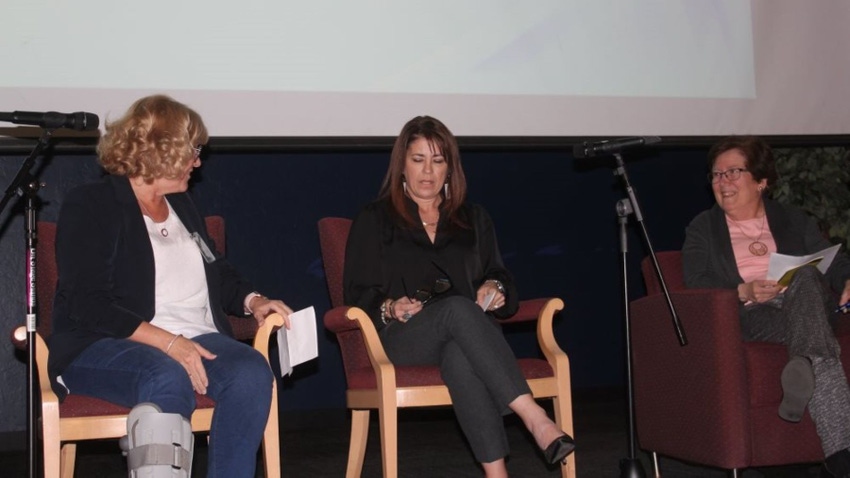
The president of the Arizona Farm Bureau says the organization withdrew from Gov. Katie Hobbs’ Water Policy Council because its leaders believed their suggestions for the state’s water future were being ignored.
The Farm Bureau and others announced last fall they were quitting the Democrat-led council, which has been discussing proposals for groundwater management as drought and high demand have drawn down aquifers in areas fed by the overdeveloped Colorado River.
“We believe practices in place have been deaf to the concerns of Arizona’s 30,000 farm and ranch family members,” AFB President Stefanie Smallhouse told Farm Press.
“After months of deliberation, the committee’s direction --- and thereby the outcome of the greater Council -- appears to be predetermined via seriously flawed attempts of the past,” added Smallhouse, a fifth-generation farmer and rancher. “At best, our priorities have been given little committee consideration and, at worst, have been totally dismissed. This is unacceptable to those who will undoubtedly be impacted immediately and directly by any rural groundwater regulatory framework.”
In its departure from the Council, the Farm Bureau did note: “While we depart and turn our time and attention to efforts where we can be heard, we have extended an offer to the governor to convene a diverse group of agricultural stakeholders to meet with her directly in the interest of Arizona’s food and water future.”
“The biggest gap between where the state and agriculture are involves the 40-year-old Groundwater Act," Smallhouse told Farm Press. "Farmers have had a lot of time to think about how they would have done it differently if they could go back to 1980, creating a new framework with more flexibility.
“We have a situation where folks in rural Arizona have been told they can come up with a new management framework because an Active Management Area doesn’t fit most places. We’re trying to take the lessons we learned from the Groundwater Management Act and fix them. Why can’t we change them? It didn’t work out the way we thought it would four decades ago and we now have an opportunity to create a new framework with more flexibility. That’s all we want to do.”
Plan being discussed
Smallhouse’s remarks come as the Arizona Department of Water Resources has started talks about a seventh active water management area in Arizona, following months of council discussions and numerous failed attempts at addressing groundwater management through legislation, the Arizona Republic reports.
Farmers are apoplectic over plans to create an active groundwater management area in the more than 1,300-square-mile Gila Bend Basin southwest of Phoenix, considered a priority basin because of its severe groundwater level declines, according to the Republic.
“In terms of the Governor’s Water Council, we basically got to the point where we were saying the same things over and over again and wasting our time,” Smallhouse told Farm Press. “People have said that by walking away, we were no longer part of the conversation, but we weren’t really part of the conversation anyway.
“If we had stayed on the council, it would have been assumed that the product that ultimately resulted was something we could live with. And it wasn’t because compromise is not a word that’s discussed in that group. At some point, you have to break the chain and start over again. That’s what we did and the bill we forwarded to the state legislature was the first groundwater management framework that agriculture has ever come up with from its own community --- and that’s a big deal.
“We’re kind of a one-note opera because most of our energy is being spent on securing agricultural water in Arizona and ensuring that groundwater regulation isn’t applied to the whole state, but just where it’s needed.”
Women in Water and Ag
Smallhouse spoke to Farm Press as she was attending the recent Women in Water and Agriculture conference in Tucson, Ariz., sponsored by the Agribusiness and Water Council of Arizona. Organizers said the Jan. 31 event was designed to “support, promote, celebrate, and inspire women with careers and interest in water and agriculture.”
In a jam-packed agenda, 15 speakers --- all female --- took the podium at the University of Arizona’s student union to discuss a plethora of topics ranging from agriculture water research to tribal water policies.
One of the most popular presentations was a panel discussion on Women in Leadership positions with speakers representing Salt River Project, the Arizona Farm Bureau, and the director of the Water Resources Research Center.
Citing the importance of the topic that knows no gender difference, WRCC Director Sharon Megdal acknowledged: “You can’t separate water from agriculture because agriculture is the biggest water user in the state.”
Recommended SRP’s Water Resources General Manager Leslie Mayers: “Don’t be afraid to say ‘Yes’ to something new. Take the risks. Enjoy the rewards.”
Emphasizing the fact that April is recognized as Water Awareness Month in the state, Smallhouse told the gathering: “The ag industry emphasizes water awareness every month.”
Asked later by Farm Press what was uppermost on the Farm Bureau concern list, she said, “No surprises as our discussions right now center on the Farm Bill, labor, and water issues, nothing really new, but at the state and regional level, it’s pretty much single focus on water.”
About the Author(s)
You May Also Like




